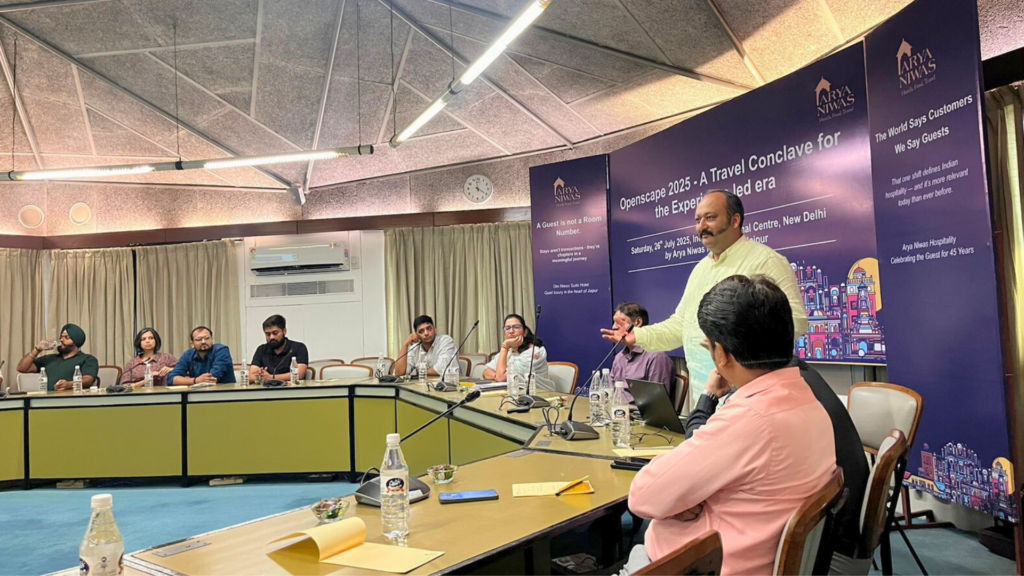AI in Travel
Booking.com shares global AI trends–what travellers really think

Booking.com released its Global AI Sentiment Report on Wednesday (July 23), tapping into the views of over 37,000 consumers across 33 countries to find out how everyday people are using, feeling about, and trusting artificial intelligence (AI)—especially when it comes to travel.
The report shows Canadians are especially curious:
- 81% are excited about AI
- 71% say they’re familiar with it
- 78% are interested in using it for future travel
But around the world, reactions vary—some are ready to dive in, while others are still a bit hesitant. It’s a clear reminder that trust matters just as much as innovation.
READ MORE: How will AI change the travel industry & help travel advisors? Experts weigh in
The study was conducted via an online questionnaire between April and May 2025, gathering responses from 37,325 people across 33 markets (1,007 were from Canada).
How are people using AI for travel?
AI is quickly becoming part of the travel experience, the company’s study says.
In Canada, 61 per cent of people believe AI-powered trip planning will be the norm before long.
READ MORE: How four travel pros are using AI to improve their operations & save time
Nearly half (48%) have already used it for travel in some way—mostly for planning or booking (96%), or while actually on their trip (93%).
When it comes to trip planning, Canadians are turning to AI to:
- Find the best times and places to visit (39%)
- Discover cultural experiences (34%)
- Get restaurant tips (35%)
Interestingly, more people now trust AI assistants (17%) to help them plan than coworkers (13%) or influencers (9%), the study says.
According to respondents, while travelling, AI is especially helpful for:
- Translating languages (54%)
- Recommending things to do (40%)
- Suggesting where to eat (38%)
- Navigating cities and transport (37%)
After the trip? AI is most commonly used to touch up travel photos—32 per cent of Canadians say it’s their go-to tool for editing memories.
But it’s not just about convenience. Over half of Canadian travelers (54%) say AI makes travel easier, and many (61%) like how it can help them avoid busy tourist spots or peak times. A growing number (52%) also want AI to point them toward experiences that support local communities.
AI as a helper, not the boss
AI is everywhere now—from search engines and streaming platforms to generative tools like chatbots. In Canada:
- 97% use AI-powered search
- 86% get personalized content recommendations
- 61% have tried out generative AI tools
Still, most people want a human touch. Almost half (47%) say AI feels impersonal. Even when they trust the technology, many double-check the results: 43% always fact-check, and 21% sometimes do. Only 4% say they fully trust AI.
So, while AI is clearly useful, most travellers aren’t ready to hand over total control. Only seven per cent are comfortable with AI making decisions for them. Most prefer it as a smart assistant—not a replacement for human judgment, the study says.
Diverse sentiments around the world
The report segments global consumers into distinct groups based on their views on AI:
AI Enthusiasts (27%): Curious and hopeful about its potential
AI Advocates (5%): Actively promoting responsible AI adoption
AI Cautious (22%): Hesitant or concerned about AI’s direction
AI Skeptics (12%): Deeply wary of the technology
AI Detractors (42%): Resistant to using AI altogether
Even among those who are excited about AI (81%), concerns remain widespread.
Consumers see AI as a tool that can simplify life (55%), save time (47%), boost productivity (25%), and support learning (42%), but also recognize the need for thoughtful, ethical use.
Mapping the AI mindset: regional variations
Significant regional differences emerge in consumer attitudes toward AI. Latin America (LATAM) leads globally in enthusiasm and familiarity, with 98% of respondents excited about AI and 89% understanding how it works.
The Asia Pacific (APAC) region follows closely, showing the highest willingness to integrate AI into daily life-41% use AI for education and the same share for transport.
North America and the Europe & Middle East region stand out as more cautious when it comes to AI, showing higher levels of skepticism and lower overall trust, the study says.
While 77% of people worldwide have at least some trust in AI, nearly one in four (23%) say they rarely or never trust the information it provides.
That number jumps in these two regions—32% in North America and 29% in Europe & the Middle East. People in these areas are also more likely to double-check what AI tells them, pointing to a strong desire for greater transparency and reassurance as AI becomes more integrated into daily life.
Don’t miss a single travel story: subscribe to PAX today! Click here to follow PAX on Facebook.
AI in Travel
With focus on AI, sustainable travel Arya Niwas organises Openscapes 2025 in New Delhi

The opportunities and challenges that issues like artificial intelligence, sustainability and experiential travel pose to the tourism industry in India and overseas were highlighted at Openscapes 2025, a travel conclave in New Delhi on Saturday.
Organised by Arya Niwas, a hospitality group based in Jaipur, the conclave served as a participative platform to explore transformative ideas for the tourism sector, addressing pressing issues such as sustainability, experiential curation, the role of artificial intelligence (AI), and the integration of responsible practices into the travel experience.
Drawing stakeholders from across India’s hospitality industry, the conclave was organised with the core theme of Projecting India and Rajasthan with a stronger, more meaningful narrative.
“This is the first conclave. It is called Openscapes. We hope that we will be having more such dialogue-based conclaves on travel. There is a need for us to behave as one in the travel industry and to move forward together because the ultimate aim is to serve the guests and make the guests win,” Pooja Bansal, Owner and General Manager, Arya Niwas, told India & You on the sidelines of the event.
The urgency of the issues raised at the meeting was underscored by leading tour operators, who highlighted that Indian tourism, particularly in recent years, “has not been sustainable and things have gone really, really bad.”
The conclave drew stakeholders from across India’s hospitality industry
“When we talk about sustainability with experiential tourism, the experience at the grassroot level, meeting local people with a bit of sustainability, offers eye-opening encounters. Yet, there are challenges,” Navneet Arora, Managing Director, VINString Holidays, a travel agency in New Delhi, told India & You.
The meeting illustrated both obstacles and achievements in rural and urban experiential tourism. Operators cited instances where visitors’ immersion in heritage neighbourhoods and private homes fostered mutual pride among locals and tourists. However, they also warned against approaches that leave rural residents feeling like “monkeys in the zoo,” underscoring the necessity of responsible, respectful interaction, something now addressed by ensuring a share of tour proceeds benefit the communities involved. Sustainability, participants argued, extends well beyond eco-friendly rhetoric.
The conclave highlighted innovative tour formats, slow tourism, creative workshops and direct engagement with artisans, as pathways for deeper, more rewarding guest experiences.
“I think that is the call for the future, because automation has to come in. If we are not doing automation today, we are backwards. AI is important. The event opens up eyes for a lot of people. Difficult, but yes, AI and sustainability are important and doable,” Arora added.
“The interpretation of sustainability has become very cliché. This was a session to break that,” said Bansal.
Participants at the Openscapes 2025 called for a sustained dialogue, with suggestions for sector-wide conventions and targetted sessions on marketing and AI and more collaborative initiatives.
AI in Travel
Sabre Corporation’s Strategic Partnership with Christopherson Business Travel and Its Implications for Undervalued Cloud and AI Stocks

Sabre Corporation (NASDAQ: SABR) has long been a cornerstone of the global travel technology sector, but its recent strategic partnership with Christopherson Business Travel marks a pivotal evolution. By leveraging its AI-driven platform and cloud-native infrastructure, Sabre is not only modernizing corporate travel management but also positioning itself as a catalyst for growth in the undervalued travel tech sector. For investors, this collaboration offers a compelling case study in how AI and cloud innovation can unlock long-term value in a niche yet resilient market.
A Strategic Alliance for the Future of Corporate Travel
On July 17, 2025, Sabre announced a multi-year agreement to become Christopherson Business Travel’s primary technology partner. This partnership is more than a transactional arrangement—it’s a strategic alignment of two companies aiming to redefine corporate travel through automation, real-time data, and personalized service. Sabre’s AI-powered tools, including Sabre Red 360, Trip Proposal, and Market Intelligence, will streamline operations for Christopherson, enabling faster decision-making and enhanced client offerings.
The integration of Sabre’s cloud-native infrastructure into Christopherson’s proprietary Andavo platform is particularly noteworthy. This move allows for real-time orchestration of multi-source content (air, hotel, rail, ground) and seamless API-driven integrations, reducing manual effort and improving scalability. As Chad Maughan, CTO of Christopherson, noted, Sabre’s architecture provides the operational flexibility needed to adapt to evolving client demands—a critical advantage in the post-pandemic corporate travel landscape.
Sabre’s Financial Resilience and AI-Driven Growth
Sabre’s financial performance in 2024 underscores its transition from a turnaround story to a growth-oriented entity. Revenue increased to $3 billion, with adjusted EBITDA rising to $517 million—a 54% year-over-year improvement. While IT Solutions revenue dipped due to de-migrations, the Travel Solutions and Distribution segments grew by 4% and 6%, respectively, driven by demand for Sabre’s AI-powered tools.
The company’s market cap of $1.222 billion pales in comparison to AI/cloud giants like Databricks ($62 billion) or Snowflake ($43.6 billion), but this undervaluation reflects Sabre’s niche focus. Its strategic investments in Sabre Mosaic—a modular platform combining AI, cloud, and traditional agent workflows—position it to capture a larger share of the corporate travel market, which is projected to grow as businesses prioritize cost optimization and efficiency.
The AI/Cloud Travel Tech Opportunity
The broader travel tech sector is undergoing a transformation fueled by generative AI. According to Skift Research, AI-driven tools could create a $28 billion+ opportunity for the industry, with applications in personalized itineraries, dynamic pricing, and automated customer service. Sabre’s Automated Exchanges & Refunds and Agency Retailer solutions are already streamlining post-booking processes, reducing manual intervention by up to 70%.
However, Sabre is not alone in the race to monetize AI in travel. Competitors like C3.ai (NYSE: AI), Marvell Technology (NASDAQ: MRVL), and DigitalOcean (DOCN) are also leveraging cloud and AI to drive growth. C3.ai’s predictive analytics tools, for instance, have secured government contracts worth $450 million, while Marvell’s AI-optimized chips are powering data centers for hyperscale providers. Yet, Sabre’s deep vertical integration into travel-specific workflows gives it a unique edge in the corporate travel niche.
Why Sabre Is an Undervalued Investment
Despite its strategic advantages, Sabre remains overlooked by many investors. Its current price-to-earnings ratio (P/E) of 8.5 is significantly lower than the industry average of 18.5, and its hedge fund ownership (11.2%) suggests growing confidence in its AI-driven roadmap. The partnership with Christopherson is a validation of Sabre’s value proposition: it enables the company to scale its AI/Cloud offerings without overhauling existing systems, a critical factor for travel agencies seeking cost-effective modernization.
For investors, the key question is whether Sabre can replicate its success in other verticals. The company’s PowerSuite Cloud platform, which automates operations and integrates NDC content, is already gaining traction among mid-sized travel agencies. If Sabre can expand its footprint in the corporate and leisure travel markets, its revenue could outpace the 10% growth projected by analysts.
Conclusion: A Strategic Bet on AI-Driven Travel
Sabre’s partnership with Christopherson Business Travel is a microcosm of the broader shift toward AI and cloud-native solutions in travel technology. While the company may lack the valuation of tech giants like Microsoft or Google, its focus on vertical-specific innovation and operational efficiency makes it a compelling play for investors seeking exposure to the travel sector’s AI revolution.
For those considering a diversified portfolio, Sabre offers a unique blend of undervaluation and growth potential. However, it should be viewed as a complementary holding to broader AI/cloud stocks like C3.ai or Marvell, rather than a standalone bet. As the travel industry continues to embrace AI-driven automation, Sabre’s ability to deliver scalable, client-centric solutions will likely drive long-term value for both its partners and shareholders.
AI in Travel
AI Travel Tricks: Watch Out for the Road to Nowhere – Herald/Review Media

AI Travel Tricks: Watch Out for the Road to Nowhere Herald/Review Media
Source link
-

 Brand Stories6 days ago
Brand Stories6 days agoBloom Hotels: A Modern Vision of Hospitality Redefining Travel
-

 Brand Stories23 hours ago
Brand Stories23 hours agoCheQin.ai sets a new standard for hotel booking with its AI capabilities: empowering travellers to bargain, choose the best, and book with clarity.
-

 Destinations & Things To Do7 days ago
Destinations & Things To Do7 days agoUntouched Destinations: Stunning Hidden Gems You Must Visit
-

 AI in Travel7 days ago
AI in Travel7 days agoAI Travel Revolution: Must-Have Guide to the Best Experience
-

 Brand Stories3 weeks ago
Brand Stories3 weeks agoVoice AI Startup ElevenLabs Plans to Add Hubs Around the World
-

 Brand Stories2 weeks ago
Brand Stories2 weeks agoHow Elon Musk’s rogue Grok chatbot became a cautionary AI tale
-

 Destinations & Things To Do19 hours ago
Destinations & Things To Do19 hours agoThis Hidden Beach in India Glows at Night-But Only in One Secret Season
-

 Asia Travel Pulse3 weeks ago
Asia Travel Pulse3 weeks agoLooking For Adventure In Asia? Here Are 7 Epic Destinations You Need To Experience At Least Once – Zee News
-

 AI in Travel3 weeks ago
AI in Travel3 weeks ago‘Will AI take my job?’ A trip to a Beijing fortune-telling bar to see what lies ahead | China
-

 Brand Stories3 weeks ago
Brand Stories3 weeks agoChatGPT — the last of the great romantics

You must be logged in to post a comment Login